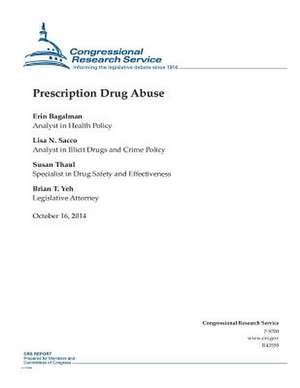Prescription Drug Abuse
Autor Congressional Research Serviceen Limba Engleză Paperback
Preț: 119.95 lei
Nou
Puncte Express: 180
Preț estimativ în valută:
22.96€ • 23.62$ • 19.05£
22.96€ • 23.62$ • 19.05£
Carte disponibilă
Livrare economică 28 ianuarie-11 februarie
Preluare comenzi: 021 569.72.76
Specificații
ISBN-13: 9781502914736
ISBN-10: 1502914735
Pagini: 24
Dimensiuni: 216 x 279 x 1 mm
Greutate: 0.08 kg
Editura: CREATESPACE
ISBN-10: 1502914735
Pagini: 24
Dimensiuni: 216 x 279 x 1 mm
Greutate: 0.08 kg
Editura: CREATESPACE
